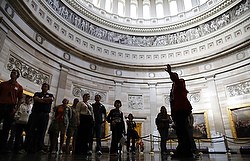
Visitors are led on an official tour, which had been suspended during the 16-day government shutdown, at the U.S. Capitol in Washington Oct. 17. The partial government shutdown and standoff over the debt ceiling ended the previous evening when Congress voted on a temporary funding bill that also raised the nation’s borrowing limit. CNS photo/Jonathan Ernst, Reuters
“The shutdown has had a widespread impact on many people, especially the poor, who suffered for lack of basic services during the period,” said Bishop Stephen Blaire of Stockton, Calif., chairman of the Committee on Domestic Justice and Human Development. “With the government now open, beneficiaries of government services, particularly the elderly and children, can hope to resume a normal life with a safety net securely in place.”
The bishops will continue to advocate for a “circle of protection” around programs that serve the poor and vulnerable people at home and abroad. The bishops are still urging Congress to replace the mandatory across-the-board spending cuts (the “sequester”) with a responsible budget that provides adequate funding for anti-poverty programs.
The bishops also remain deeply concerned regarding the Health and Human Services mandate that will force employers to provide health coverage that entails payment for abortifacients, contraceptives, and sterilizations, even if doing so violates the employers’ deeply-held religious or moral beliefs. Catholic ministries that provide health care, educational, and social services generally are not exempt from the mandate, and enforcement against them will begin Jan. 1, putting at risk the poor and vulnerable served by those ministries.
“The bishops have pressed for legislative relief from the HHS mandate since its inception more than two years ago,” said Archbishop William E. Lori of Baltimore, chairman of the Ad Hoc Committee on Religious Liberty. “Church efforts to protect rights of conscience will continue despite this temporary setback.”
The bishops urged the House and Senate to avoid a government shutdown. In September, 30 letters to the House and Senate, Archbishop José Gomez of Los Angeles, Bishop Blaire and Bishop Richard Pates of Des Moines, Iowa, urged “wise bipartisan leadership and moral clarity in crafting a plan to ensure the government continues to operate and meet its responsibility to protect human life and dignity, care for poor and vulnerable people at home and abroad, and advance the universal common good.”
Archbishop Gomez chairs the USCCB Committee on Migration. Bishop Blaire chairs the Committee on Domestic Justice and Human Development. Bishop Pates chairs the Committee on International Justice and Peace.
In a September 26 letter, Archbishop Lori and Cardinal Seán O’Malley of Boston, chair of the bishops’ Pro-Life Activities committee, called for legislation that preserves “religious freedom and the right of conscience for all who take part in our health care system.”
They urged that the policy of the Health Care Conscience Rights Act (H.R. 940/S. 1204) be incorporated into must-pass legislation such as the Continuing Resolution and debt ceiling bill.
“Protection for conscience rights in health care is of especially great importance to the Catholic Church, which daily contributes to the welfare of U.S. society through schools, social services, hospitals and assisted living facilities,” they wrote. “These institutions, which have been part of the Church’s ministry since the earliest days of our country, arose from religious convictions. They should not be told by government to abandon or compromise those convictions in order to continue serving their own employees or the neediest Americans. Nor should individual Catholics or others be told they cannot legally purchase or provide health coverage unless they violate their conscience.”
